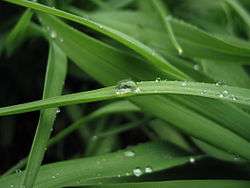Definify.com
Definition 2026
Rasa
rasa
rasa
Czech
Etymology
Borrowing from German Rasse, from French race, from Italian razza, possibly from Arabic رَأْس (raʾs, “head”).
Noun
rasa f
- race (group of people)
Declension
Related terms
Esperanto
Adjective
rasa (accusative singular rasan, plural rasaj, accusative plural rasajn)
Related terms
Latin
Participle
rāsa
- nominative feminine singular of rāsus
- nominative neuter plural of rāsus
- accusative neuter plural of rāsus
- vocative feminine singular of rāsus
- vocative neuter plural of rāsus
rāsā
- ablative feminine singular of rāsus
Latvian

Etymology
From Proto-Balto-Slavic *rasāˀ, from Proto-Indo-European *Hroseh₂. Cognates include Lithuanian rasà, Old Church Slavonic роса (rosa), Russian, Ukrainian, Belarusian, Bulgarian роса (rosá), Upper Sorbian, Czech, Polish rosa, Sanskrit रस (rásaḥ, “juice, liquid”), रसा (rasā́, “moisture, humidity”), Latin rōs.[1]
Noun
rasa f (4th declension)
- dew (moisture in the air that settles on plants in the morning)
- rīta rasa ― morning dew
- rasas lāses ― dew drops
- sasalusi rasa ― frozen dew
- samērcēt kājas rasā ― to soak one's feet in dew
- very light rain, drizzle
- viegla rasas migla nokārās pār visu ciemu ― a light drizzle lowered its mist over the whole village
- tiny, dew-like drops
- pierē drīz jau iemetās pirmā sviedru rasa ― on (his) forehead the first drops of sweat will soon appear
Declension
| singular (vienskaitlis) | plural (daudzskaitlis) | |
|---|---|---|
| nominative (nominatīvs) | rasa | — |
| accusative (akuzatīvs) | rasu | — |
| genitive (ģenitīvs) | rasas | — |
| dative (datīvs) | rasai | — |
| instrumental (instrumentālis) | rasu | — |
| locative (lokatīvs) | rasā | — |
| vocative (vokatīvs) | rasa | — |
Derived terms
References
- ↑ Karulis, Konstantīns (1992), “rasa”, in Latviešu Etimoloģijas Vārdnīca (in Latvian), Rīga: AVOTS, ISBN 9984-700-12-7
Polish
Etymology
Borrowing from German Rasse, from French race, from Italian razza, possibly from Arabic رَأْس (raʾs, “head”).
Pronunciation
Noun
rasa f
Declension
Derived terms
Serbo-Croatian
Etymology
Borrowing from German Rasse, from French race, from Italian razza, possibly from Arabic رَأْس (raʾs, “head”).
Pronunciation
- IPA(key): /râsa/
- Hyphenation: ra‧sa
Noun
rȁsa f (Cyrillic spelling ра̏са)
- race (group of people)
Declension
Slovene
Etymology
Borrowing from German Rasse, from French race, from Italian razza, possibly from Arabic رَأْس (raʾs, “head”).
Pronunciation
- IPA(key): /ˈràːsa/
- Tonal orthography: rása
Noun
rása f (genitive ráse, nominative plural ráse)
- race (a large group of people set apart from others on the basis of a common heritage)